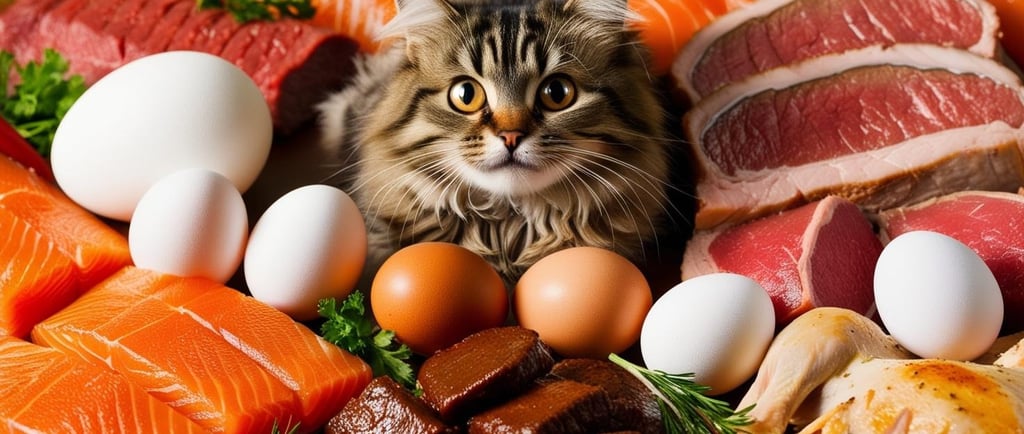Whole Foods That Provide Essential Nutrients for Cats & Kittens
Discover the best whole foods packed with essential nutrients for cats and kittens to support their health, growth, and vitality. Learn about protein-rich meats, vital vitamins, and minerals that promote strong bones, a shiny coat, and overall well-being. Read now for expert insights and practical feeding tips!
Dr. Ghunaim
1/23/20253 min read


Whole Foods That Provide Essential Nutrients for Cats & Kittens
Cats, as obligate carnivores, require a diet rich in animal-based nutrients to thrive. Providing whole foods that deliver essential nutrients is crucial to their health, supporting everything from muscle growth and energy production to immune function and coat health. In this article, we will explore the essential nutrients that cats and kittens need and the whole foods that best provide them.
Essential Nutrients for Cats & Kittens
1. Protein
Protein is the cornerstone of a feline diet, supporting muscle development, tissue repair, and enzyme production. Kittens, in particular, have a high protein requirement to support their rapid growth.
Whole Food Sources:
Chicken: High in lean protein and amino acids such as taurine, crucial for heart and eye health.
Turkey: A low-fat protein source that provides essential amino acids.
Beef: Rich in protein, iron, and zinc.
Fish (e.g., salmon, sardines): High in omega-3 fatty acids and quality protein.
Scientific Insight: According to the National Research Council (NRC), adult cats require at least 26% protein in their diet, while kittens need around 30% [1].
2. Taurine
Taurine is an essential amino acid for cats, necessary for cardiovascular health, vision, and reproduction. Unlike humans, cats cannot synthesize sufficient taurine and must obtain it from their diet.
Whole Food Sources:
Heart (chicken, beef): One of the richest natural sources of taurine.
Seafood (e.g., shrimp, clams): High in taurine content.
Scientific Insight: Taurine deficiency can lead to serious health issues, including dilated cardiomyopathy and retinal degeneration [2].
3. Fats and Fatty Acids
Fats provide a concentrated energy source for cats and are essential for the absorption of fat-soluble vitamins (A, D, E, K). Omega-3 and omega-6 fatty acids are particularly important for skin, coat, and cognitive function.
Whole Food Sources:
Salmon: Rich in EPA and DHA omega-3 fatty acids.
Chicken fat: Provides linoleic acid, an essential omega-6 fatty acid.
Egg yolks: Contain healthy fats and biotin.
Scientific Insight: Studies show that a diet with a balanced ratio of omega-3 to omega-6 fatty acids can help reduce inflammation and promote overall feline health [3].
4. Vitamins
Cats require a variety of vitamins for optimal metabolic function, immune support, and overall well-being.
Whole Food Sources:
Liver: A powerhouse of vitamins A, D, and B-complex.
Eggs: Rich in vitamin B12, biotin, and riboflavin.
Fish oil: A natural source of vitamin D.
Scientific Insight: Unlike humans, cats cannot convert beta-carotene from plant sources into vitamin A, necessitating preformed vitamin A from animal-based foods [4].
5. Minerals
Essential minerals like calcium, phosphorus, and magnesium are critical for bone health, nerve function, and enzymatic reactions.
Whole Food Sources:
Bone meal: A natural source of calcium and phosphorus.
Sardines (with bones): High in calcium and phosphorus.
Organ meats: Provide selenium, iron, and zinc.
Scientific Insight: The correct calcium-to-phosphorus ratio (1.2:1) is crucial for healthy bone development, especially in growing kittens [5].
6. Water
Hydration is essential for overall feline health, supporting kidney function and preventing urinary tract issues.
Whole Food Sources:
Raw meat: Contains a high water content that supports hydration.
Bone broth: A nutrient-dense liquid that enhances hydration.
Scientific Insight: Cats have a low thirst drive and are more reliant on moisture from their food, making wet foods an important dietary component [6].
Formulating a Balanced Whole Food Diet
When providing whole foods, it is important to ensure a balanced diet to prevent deficiencies or excesses. A proper feline diet should consist of:
80% muscle meat (e.g., chicken breast, turkey, beef)
10% organ meat (e.g., liver, heart)
10% bone content (e.g., crushed bones, bone meal)
Sample Whole Food Meal Plan
Breakfast:
Chicken thigh (boneless)
Chicken liver (small portion)
Salmon oil (1 tsp)
Lunch:
Ground turkey
Bone broth
Egg yolk
Dinner:
Beef heart
Sardines (with bones)
Chopped spinach (small amount for fiber)
Precautions When Feeding Whole Foods
While whole foods provide numerous benefits, some precautions include:
Bacterial contamination: Ensure raw meats are handled and stored properly to avoid bacterial contamination.
Bone safety: Use finely ground bones to prevent choking hazards.
Nutrient balance: Consulting with a veterinarian or a pet nutritionist is essential to ensure the diet meets feline nutritional requirements.
Conclusion
Feeding whole foods to cats and kittens provides numerous health benefits by delivering essential nutrients in their most bioavailable form. By understanding the dietary needs of felines and offering nutrient-rich, species-appropriate foods, pet owners can support their cats' long-term health and well-being.
References:
National Research Council. "Nutrient Requirements of Dogs and Cats." The National Academies Press, 2006.
Heinze, C. R., Freeman, L. M., & Martin, C. R. "Taurine status in dogs and cats with dilated cardiomyopathy." Journal of Veterinary Internal Medicine, 2009.
Bauer, J. E. "Therapeutic use of fish oils in companion animals." Journal of the American Veterinary Medical Association, 2011.
Morris, J. G., & Rogers, Q. R. "Vitamin A nutrition in the cat." The Journal of Nutrition, 1994.
Case, L. P., Daristotle, L., Hayek, M. G., & Raasch, M. F. "Canine and Feline Nutrition." Elsevier Health Sciences, 2010.
Buckley, C. M. F., Hawthorne, A. J., Colyer, A., & Stevenson, A. E. "Effect of diet on water intake and urine parameters in cats." Journal of Feline Medicine and Surgery, 2011.
